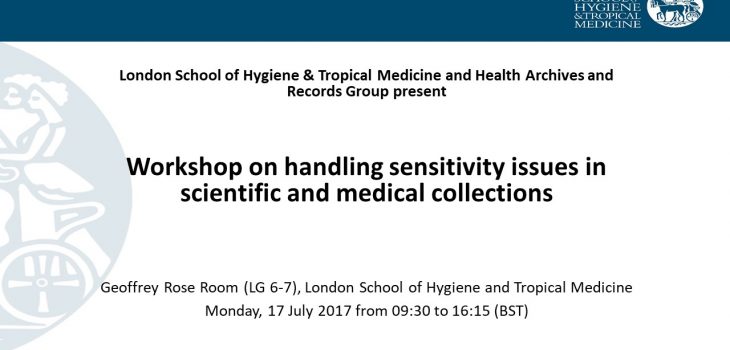The morning session involved 8 short case studies by invited speakers including the Wellcome Trust, National Institute for Medical Research, Lothian Health Service Archives, London Metropolitan Archives, University of Edinburgh, University of Bristol, Institute of Commonwealth Studies and London School of Hygiene & Tropical Medicine [see presentation below]. The talks and discussion afterwards provided a useful mixture of highlighting difficulties and providing methodologies to certain sensitivity issues, which included: identifying gaps within sensitivity review policies; examining types of sensitive records; creating new systems to provide access, but preserve anonymity; how sensitivity decisions change over time; negotiating access with donors/donor organisations and managing access to politically sensitive oral histories.
[gview file=”http://blogs.lshtm.ac.uk/library/files/2017/07/LSHTM_Workshop_17-July_The-Whitehall-Study_Sensitive-records-within-a-longitudinal-health-survey.pdf”]
During lunch, LSHTM Cataloguing Archivist, Chris Olver, ran a drop-in session showcasing redacted examples of sensitive material within the Whitehall Study collection. This was followed by a practical session, where delegates were split into groups to discuss various aspects of sensitivity affecting archive practice. The groups’ responses were collated together onto Padlet boards, which can be found here, along with images of the posters created on the day.
The day highlighted a numbers of areas that required improvement within the sector, that can be surmised as: more training, both on existing legislation and broader sensitivity issues (cultural sensitivity, donor relations); greater consistency across metadata/standards and a single repository for guidance on sensitivity. It was agreed that any follow-up events would need to include wider discussion of digital sensitivities through exploring born-digital material, big data, wearable technology, and also have input from the legal profession, historians and other information management professionals.
Special thank you for the help in LSHTM Archive team in hosting the event and Geoff Browell (KCL) and Clare Button (University of Edinburgh) from HARG for co-creating and hosting the event at the School.
A full report of the proceedings of the day is available on the HARG website.







